Q&A: ROBERT WRIGHT, Author and Blogger
Written on December 30th, 2014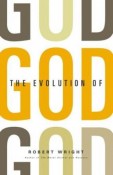 |
Q&A: Q&A: PHILIP GOLDBERG/GREG EPSTEIN – Authors
Written on November 18th, 2014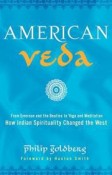 |
Q&A: Howard Bloom, Author – THE GOD PROBLEM: How a Godless Cosmos Creates
Written on January 22nd, 2013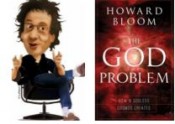 |
Aired: 01/20/13
HOWARD BLOOM has been called “next in a lineage of seminal thinkers that includes Newton, Darwin, Einstein,[and] Freud,” by Britain’s Channel4 TV , and “the next Stephen Hawking” by Gear Magazine. His books include The Lucifer Principle: A Scientific Expedition Into the Forces of History; Global Brain: The Evolution of Mass Mind from the Big Bang to the 21st Century; The Genius of the Beast: A Radical Re-Vision of Capitalism; and his latest, THE GOD PROBLEM: How a Godless Cosmos Creates.
Heavy stuff, sure, but his biography is a lot quirkier than that list might suggest. From 1968 to 1988, Bloom made his mark in the music business, founding and running its biggest PR firm, working with Michael Jackson, Prince, Bob Marley, Bette Midler, Queen, Simon & Garfunkel, Peter Gabriel, Grandmaster Flash and the Furious Five, among many others. He helped launch Farm Aid and Amnesty International’s American presence, and put together the first public service radio campaign for solar power.
Bloom launched a successful kickstarter campaign to raise money for PR for THE GOD PROBLEM because changing a paradigm doesn’t just happen. A lot of people have given glowing blurbs to this book, but let me quote one by Barbara Ehrenreich, author of Nickel and Dimed, “If Howard Bloom is only 10 percent right, we’ll have to drastically revise our notions of the universe. There’s no mysticism in The God Problem—no God, no religion, no incommunicable spiritual insights – just the contagious joy of a great mind set loose on the biggest intellectual puzzles humans have ever faced. Whether you’re a scientist or a hyper-curious layperson, Bloom’s argument will rock your world.”
www.howardbloom.net
Q&A: STEPHEN GREENBLATT, National Book Award Winner, THE SWERVE: How the World Became Modern
Written on January 21st, 2012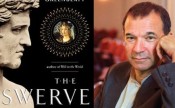 |
Aired 01/15/12
In the winter of 1417, a short, genial, cannily alert man in his late thirties plucked a very old manuscript off a library shelf, saw with excitement what he had discovered, and ordered that it be copied. The man was Poggio Braccionlini, the greatest book hunter of the Renaissance. His discovery was the last surviving manuscript of an ancient Roman philosophical epic, On the Nature of Things by Lucretius—a beautiful poem of the most dangerous ideas: that the universe functioned without the aid of gods, that religious fear was damaging to human life, and that matter was made up of very small particles in eternal motion, colliding and swerving in new directions.
The copying and translation of this ancient book fueled the Renaissance, inspiring artists such as Botticelli and thinkers such as Giordano Bruno; shaped the thought of Galileo and Freud, Darwin and Einstein; and had a revolutionary influence on writers such as Montaigne and Shakespeare and even Thomas Jefferson.
Stephen Greenblatt is John Cogan University Professor of the Humanities at Harvard University. Among his books are Will of the World: How Shakespeare Became Shakespeare, a Finalist for the 2004 National Book Award in Nonfiction and a New York Times best seller, and Hamlet in Purgatory. He holds honorary degrees from Queen Mary College of the University of London and the University of Bucharest.
Q&A: REZA ASLAN, Author
Written on May 30th, 2009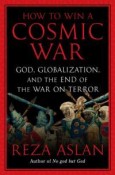 |
Aired 05/19/09
REZA ASLAN is the author of "NO GOD BUT GOD" and his new book, "HOW TO WIN A COSMIC WAR: God, Globalization and the End of the War on Terror"
REZA ASLAN says the only way to win a cosmic war is not to engage in one.
That may seem obvious to some, but he's also saying that unless we recognize that we've been pulled into a cosmic war -- what that means and how it changes things -- we haven't got a chance of "winning" or even making the best of the situation.
"A cosmic war is a battle not between armies or nations, but between the forces of good and evil. The ultimate goal of a cosmic war is to vanquish evil itself, which ensures that a cosmic war remains an absolute, eternal, and ultimately unwinnable conflict. Cosmic wars are fought not over land or politics but over identity."
1900 - 1/2 of world's population identified as members of major religions
2000 - 2/3 of world's population identified as members of major religions
Aslan believes the days of wars between nation states are over. When globalization frees people from national identity, it's replaced by other identities - especially religion. We must strip the conflict between Islam and the West of its religious connotations, and we must address the actual grievances that fuel the Jihadist movement.
A recent Gallup poll (see below) appears to back him up. According to AP: "Joblessness and poverty are a more potent source of tension between Muslims and wider European and U.S. society than religious differences, [according to] one of the first major studies of Muslim integration since the Sept. 11 terror attacks."
REZA ASLAN has a fairly unique resume. Born in Iran, emigrated wih his family to Enid, Oklahoma as a child. Degrees in religion from UC Santa Clara, UC Santa Barbara, and Harvard Divinity School, as well as an MFA from the Iowa Writers Program. His first book, NO GOD BUT GOD: The Origins, Evolution, and Future of Islam offers more than a history - and the guy can write.
The first time I interviewed him was just after Hamas had won the Palestinian election. We both hoped that having to actually run things would move Hamas in a positive direction. The US, Israel, and others weren't willing to find out.
We pick up the conversation this week, looking at the lessons of history, the lessons of the recent past, and hopes for the future.
